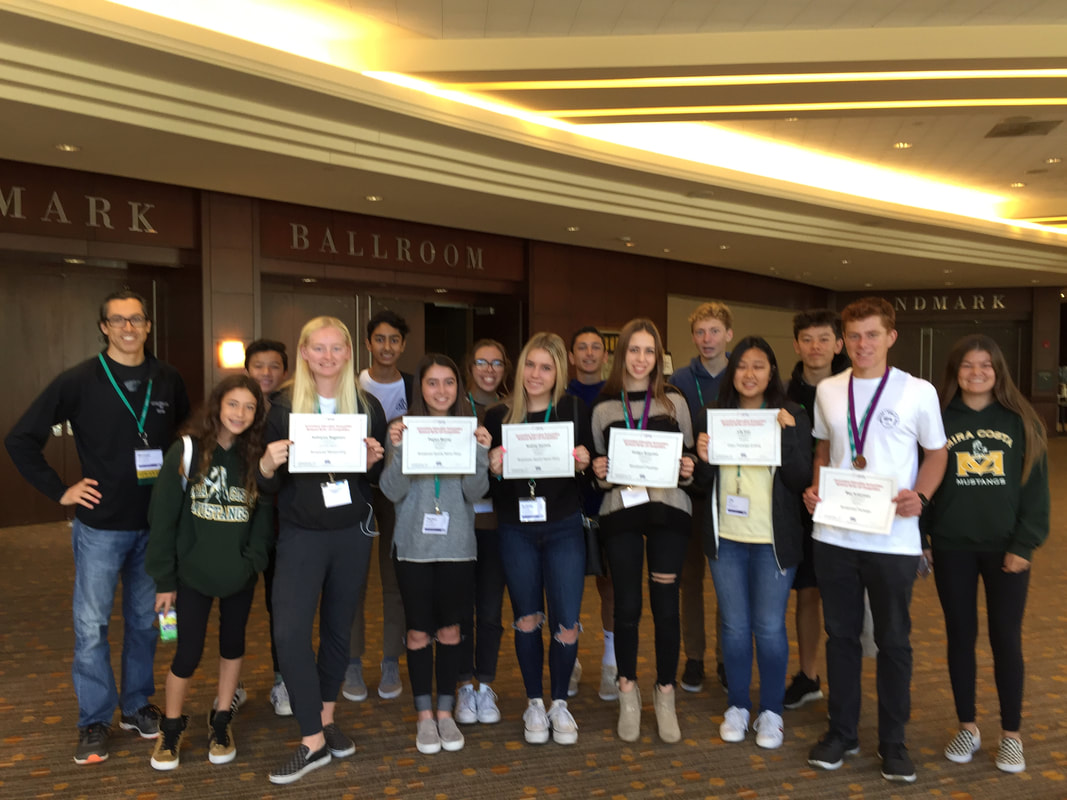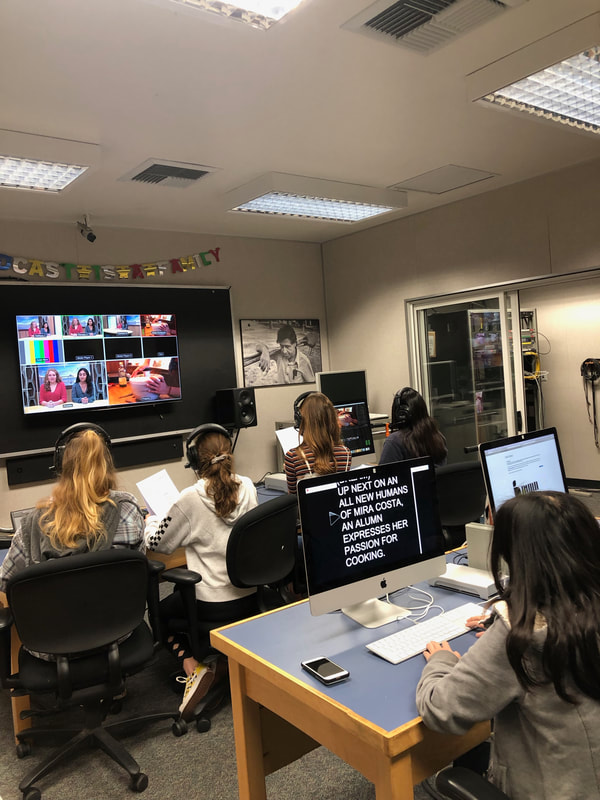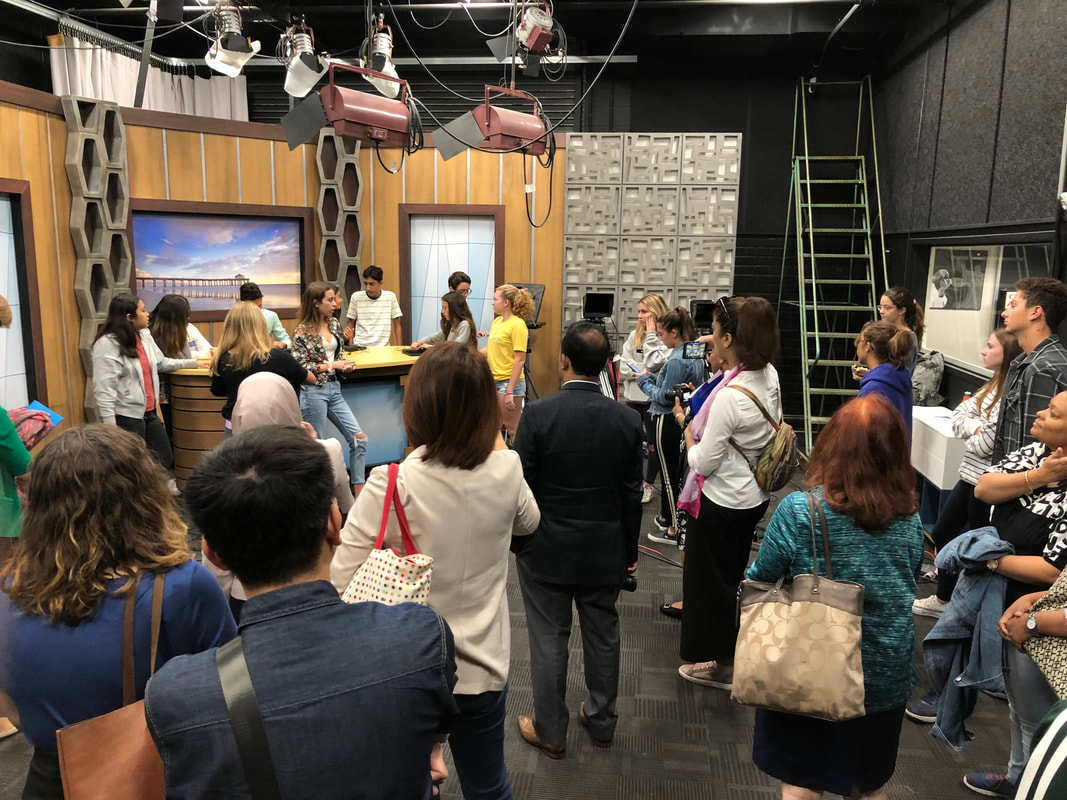What is your staff mission statement?
The Mustang Morning News is a production of students in the Broadcast Journalism classes at Mira Costa High School. The newscast is a public forum for student expression, meaning that students make all content decisions, and research, write, shoot and broadcast news stories they deem important to the Mira Costa community. There is no prior review by the school district administration, and the staff operate under the protections of California Education Code in regard to free speech, and the Tinker Supreme Court standard for student free speech. Students in the beginning Broadcast Journalism course learn about news writing, free speech law and ethics, videography, news reporting and broadcasting techniques. Advanced students produce the newscast which airs twice a week during the school year. The first newscast was aired in the spring of 1999, under the direction of adviser, Michael Hernandez. Since then, the show has grown into a nationally recognized program, and the staff have won multiple national awards for their work. Alumni of the class have continued their study of and work in journalism, television and film.
Tell us a little bit about how your staff works and what they cover. How do you tell the important stories of your community and stay dedicated to providing your community with the truth?
Our staff works in a 4 week long cycle that consists of- training week, shooting week, editing week, and revision week. During this time, we are also writing and producing live newscasts twice a week. Our producing team consists of 7 "DRIs" (directly responsible individuals) who work in teams of 3, and rotate after every cycle. The DRIs work with the News Director to come up with story ideas, which are presented to the staff during training week. Then, we break out into small groups and discuss the story ideas. From there, the DRIs and News Director assist the reporters in crafting a narrow focus statement. Then, the reporters start researching and doing pre-interviews with stakeholders. The Mustang Morning News is a "live forum for student expression" and "students make all content decisions". Through our editorial process and with the help of resources like the Student Press Law Center, we choose to report on issues that will help our audience make decisions about their lives. We cover a wide range of topics, from consent and underage drinking, to the environmental impact of Thanksgiving dinner, sexism in sports on campus, and the asbestos problem in our school library. We also produce episodes of "Humans of Mira Costa", which is a feature on alumni, staff, and students in the Mira Costa Community.
Tell us about a favorite broadcast piece your staff has produced this year that has clearly demonstrated the importance of the student free press and helped to keep your community informed, investigated an important question or problem, highlighted student or community voices.
This year, the theme of our reporting is "Youthquake". We are trying to encourage and support young people at our school in order to help them become educated about current events. To accomplish this goal, we've covered stories about the gender neutral homecoming and prom court, racial stereotypes, influence on politics by celebrities, and affirmative action, just to name a few. We've produced explainer videos on media literacy, registering to vote, and the midterm elections. But, my personal favorite story that our staff has produced this past year would have to be the package about economic privilege. Just two miles away from Mira Costa, students at Leuzinger High School aren't given the same opportunities and tools (AP classes, college counselors, extra curriculums, etc) as students at our school because of economic barriers. Before I gave the assignment to our reporters, I had them take a Buzzfeed quiz, titled "How Privileged Are You?”. The quiz opened our eyes to things we take for granted or think are "normal", like having the financial ability to pay for tutors and AP tests, or feeling safe (regardless of gender, sexual orientation or race). The reporting team went to Leuzinger to talk with their students, guidance counselors and principals, then did the same at our school and asked about the concept of universal education. We practice "solution based journalism" in the Mustang Morning News, which might sound difficult with an issue as large as universal education. These "solutions" take many forms, from web posts with links to research presented in the story, to opportunities to become involved with charities or sign petitions. We tend to produce our stories in "pairs", so we were simultaneously producing a story about affirmative action, because sometimes the best solution is to tackle the problem from a different angle, in order to continue the conversation.
Proudly powered by Weebly


